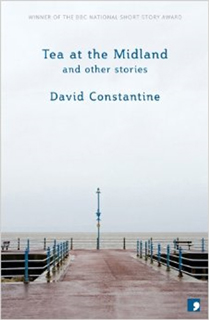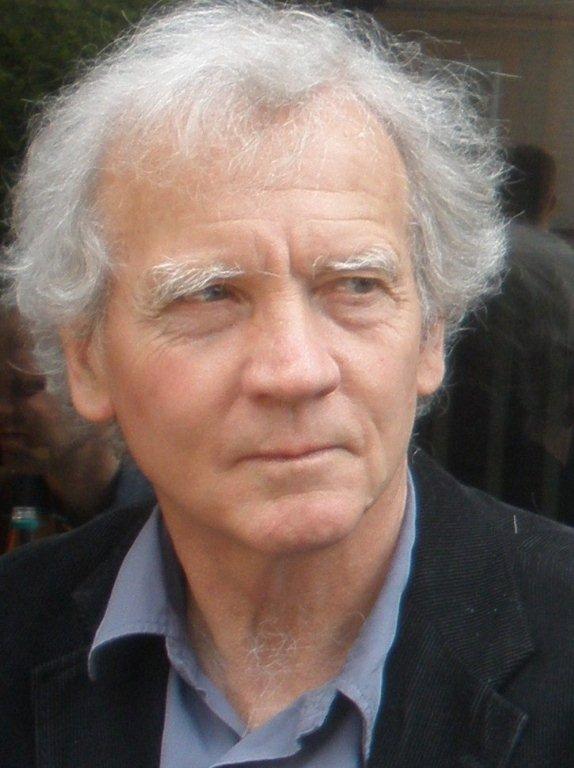
photo by Marco Masciovecchio
by Holly Dawson
If there were a handbook on how to be human when sadness and cruelty are an intrinsic part of being alive, Tea at the Midland would be it. In these sixteen stories, David Constantine compiles an encyclopaedia of suffering, as vulnerable and marginalised characters, and those who care for them, negotiate the tectonics of difficult lives.
Ev, in ‘Ev’s Garden’, was abandoned in a toilet at birth. Her fellow gardener, Eric, lost his family in his father’s suicidal house fire, whilst Sabela’s family, in ‘The House By the Weir and the Way’, were killed by the Franco regime. In some cases, the origin may be unknown, but the symptoms are there – depression, disassociation, dysfunction – with startling triggers and flashbacks, such as this from ‘Fault’: ‘childhood, from elsewhere, gripped at [Colette’s] heart like a small cold hand’.
Self-harm, suicide, bereavement, abuse, eviction, break ups, a car accident… depressingly common themes in short stories, as editors and judges often complain. The land of short fiction wouldn’t be a nice place to live. But here’s where Constantine is different. His world is one of compassion. The survival rate is high. Kindness endures.
 His stories chronicle the little interruptions that get you through the day – knocks at the door, work, a line of poetry, a remark – and the people, frequently strangers, who help you carry on. No one’s left to wallow in introversion. The collection is a celebration of the persistence of life; as Ruth states in ‘Romantic’, “One thing in my favour is I am alive”.
His stories chronicle the little interruptions that get you through the day – knocks at the door, work, a line of poetry, a remark – and the people, frequently strangers, who help you carry on. No one’s left to wallow in introversion. The collection is a celebration of the persistence of life; as Ruth states in ‘Romantic’, “One thing in my favour is I am alive”.
The result is an abundance of beautifully moving, redemptive moments. In ‘Strong Enough to Help’, an oddball poet smiles as his new friend reads his favourite Caribbean poems in her ‘voice from home so that they come alive’. Odile spontaneously follows her heart atop a donkey, led to Compostela by an infatuated pilgrim, in ‘The House by the Weir and the Way’. Ev’s wasteland blooms in ‘Ev’s Garden’. The restless wanderer, Morgan, returns to non-judgemental Ruth, against the odds, in ‘Romantic’, whilst in ‘Asylum’, teenage self-harmer Madeleine finds strength in stories and writing.
Constantine draws parallels with nature throughout the book, reinforcing the belief that human suffering is cyclical, ephemeral, as natural as rivers and trees. Apocalyptic undertones hint that you can’t stop nature, or predict it, or moralise it. He gives us droughts, rough seas and deep freezes alongside human attempts to control them – weirs, weeding, kite surfing. Life is cruel; nature is cruel; people are cruel. Let’s figure out how to keep on keeping on.
Philosophically, the collection could be the lovechild of Buddha (‘Pain is inevitable. Suffering is optional’) and Prospero (Caliban is a “thing of darkness I acknowledge mine”), but above all, I see it as a meditation on compassion. Compassion can be a rare thing in fiction and it is difficult to do well without being saccharine or disingenuous. But it fulfils an ancient urge, as Flannery O’Connor states:
There is something in us, as storytellers and as listeners to stories, that demands the redemptive act, that demands that what falls at least be offered the chance to be restored.
This collection made me a more compassionate writer. My characters often died and they were pretty much always miserable. They were vulnerable and alone and the world appeared to hate them. But the ‘Constantine Effect’ has resurrected many lives. I’ve changed endings to keep people alive. I’ve given them second chances. I’ve let in the kindness of strangers.
What do we mean by compassion? It’s when the eponymous Mr Carlton says “I’m sorry” about a stranger’s divorce, and the man says, “You meant that didn’t you?”. When Ev sees ‘Eric mumbling to a skull and gently took it off him. She saw that he had a melancholy streak. Best to keep him chatting…’ (‘Ev’s Garden’). When the narrator in ‘An Island’ develops a tender friendship with disabled Eddie who cannot speak, yet ‘in a deep sense, I knew at once what he meant’. It’s when a woman journeys to the boyhood home of her deceased ex-lover, retraces the steps he would have taken home from the horrors of war, and finds forgiveness for his affairs by seeing how important beauty would have been for him, in ‘Doubles’.
Compassion, Constantine shows, is unconditional, in the moment. He sets this up in the opening story, ‘Tea at the Midland’, with the painting of Odysseus:
Odysseus was a horrible man. He didn’t deserve the courtesy he received […] I know the foul things he will do when he gets home. But at that moment […] he is naked and helpless and the young woman is courteous to him.
 Compassion is about letting go, even though it pains you. In ‘Romantic’, Ruth lets her troubled lover, Morgan, leave with faith he’ll come back – “It’s not a promise that binds me to you”. Kramer, in ‘Asylum’, lets his daughter go ‘on a savage pilgrimage’ to regain the past. Compassion is also about going above-and-beyond. In Kramer’s eyes, it is the ability to “sympathise with other people’s lives even when your own distresses you so much you cut your face”.
Compassion is about letting go, even though it pains you. In ‘Romantic’, Ruth lets her troubled lover, Morgan, leave with faith he’ll come back – “It’s not a promise that binds me to you”. Kramer, in ‘Asylum’, lets his daughter go ‘on a savage pilgrimage’ to regain the past. Compassion is also about going above-and-beyond. In Kramer’s eyes, it is the ability to “sympathise with other people’s lives even when your own distresses you so much you cut your face”.
The compassion in Constantine’s stories comes largely from strangers, who offer quiet kindness and unexpected help. In the Odysseus tale, the collection’s title story, ‘every stranger was sacred to the people of that island’. The geriatric escapee in ‘Alphonse’ flees his nursing home to cycle around France, ‘taken in by strangers […] never wanted for food or wine or friendly tips on survival’, and the same is true of Morgan and Beatrice on their respective journeys in ‘Romantic’ and ‘The House Between the Weir and the Way’.
Is it easier to talk with strangers? Morgan thinks so:
“They tell me their life stories, they look at me as though I know what they should do next […] they only tell me things because I’m passing through […] nothing they say, however intimate, is binding.”
Likewise, a local confides in the narrator in ‘The Island’, ‘because he assumes I am passing through […] he has nothing to fear from me […] I am at least as unhappy as he is […] and he will never see me again’.
As Beth’s care home holds its last supper before eviction, in ‘Leaving Frideswide’, she looks at her vulnerable wards and wonders, ‘What will become of them?’ It’s a question we all ask at some point, in the face of observing great suffering. Constantine, in response, offers hope. He presents options for positive outcomes – but suggests it’s up to us to act. It’s up to us to reach out, to be the stranger that offers the hand.
Story is a vehicle for compassion, or perhaps it’s the other way round. Every story here contains a story, often more than one, told to a stranger as gossip, or to a care professional as a case study. In ‘Strong Enough to Help’, sharing stories helps displaced strangers forge an unlikely bond. Both characters balance the risk of reaching out with the overwhelming fear of ‘unalterable loneliness’.
The trinity of strangers, storytelling and compassion are tied together by the recurrence of pilgrimage. Many of the characters are on journeys – Odysseus in ‘Tea at the Midland’, eponymous ‘Mr Carlton’ driving to ease his bereavement, Madeline’s fictional asylum-seekers on perilous escape missions in ‘Asylum’, bicycling ‘Alphonse’ fleeing his nursing home, and Morgan in ‘Romantic’ endlessly wandering along rivers when the darkness in him rises.
The only authentic Pilgrim, though – ‘with the scallop on her backpack’ – is Beatrice, walking The Way, in ‘The House Between the Weir and the Way’. She is absorbing the lives of others whilst on a journey towards herself; all that mattered to her ‘was that things should matter’. For me, the whole collection is a pilgrimage in itself – a journey towards compassion, towards being better people. Constantine is inciting us to be like Beatrice: open, non-judgemental, searching for meaning in everyone and everything.

